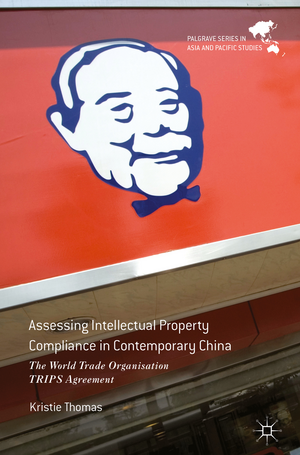Assessing Intellectual Property Compliance in Contemporary China: The World Trade Organisation TRIPS Agreement: Palgrave Series in Asia and Pacific Studies
Autor Kristie Thomasen Limba Engleză Hardback – 28 feb 2017
Since its accession to the World Trade Organisation (WTO) in December 2001, China has been committed to full compliance with the Trade-Related Intellectual Property Rights (TRIPS) Agreement. This text considers the development of intellectual property in China, and offers an interdisciplinary analysis of China’s compliance with the TRIPS Agreement using theories originating in international relations and law. It notes that despite significant efforts to amend China’s substantive IP laws to prepare for WTO accession and sweeping changes to domestic legislation, a significant gap existed between the laws on paper and as enforced in practice, and that infringements to the agreement are still prevalent. The book examines how compliance with international rules can be promoted and encouraged in a specific jurisdiction. Making a case for a wider, more interdisciplinary and global outlook, it contends that compliance needs to align with the national interests of relevant countries and jurisdictions, as governments’ economic interests support the greater enforcement of the IP laws.
| Toate formatele și edițiile | Preț | Express |
|---|---|---|
| Paperback (1) | 580.17 lei 6-8 săpt. | |
| Springer Nature Singapore – 14 iul 2018 | 580.17 lei 6-8 săpt. | |
| Hardback (1) | 783.50 lei 6-8 săpt. | |
| Springer Nature Singapore – 28 feb 2017 | 783.50 lei 6-8 săpt. |
Din seria Palgrave Series in Asia and Pacific Studies
-
 Preț: 382.95 lei
Preț: 382.95 lei -
 Preț: 386.99 lei
Preț: 386.99 lei - 15%
 Preț: 642.03 lei
Preț: 642.03 lei - 18%
 Preț: 890.54 lei
Preț: 890.54 lei - 18%
 Preț: 729.53 lei
Preț: 729.53 lei - 15%
 Preț: 645.60 lei
Preț: 645.60 lei - 15%
 Preț: 526.18 lei
Preț: 526.18 lei - 15%
 Preț: 533.39 lei
Preț: 533.39 lei - 9%
 Preț: 750.41 lei
Preț: 750.41 lei - 15%
 Preț: 642.36 lei
Preț: 642.36 lei - 15%
 Preț: 699.28 lei
Preț: 699.28 lei - 18%
 Preț: 887.68 lei
Preț: 887.68 lei - 18%
 Preț: 730.97 lei
Preț: 730.97 lei - 15%
 Preț: 697.65 lei
Preț: 697.65 lei - 18%
 Preț: 728.74 lei
Preț: 728.74 lei - 18%
 Preț: 729.53 lei
Preț: 729.53 lei - 15%
 Preț: 698.47 lei
Preț: 698.47 lei - 18%
 Preț: 732.40 lei
Preț: 732.40 lei - 18%
 Preț: 725.26 lei
Preț: 725.26 lei
Preț: 783.50 lei
Preț vechi: 955.49 lei
-18% Nou
Puncte Express: 1175
Preț estimativ în valută:
149.92€ • 156.95$ • 124.05£
149.92€ • 156.95$ • 124.05£
Carte tipărită la comandă
Livrare economică 05-19 aprilie
Preluare comenzi: 021 569.72.76
Specificații
ISBN-13: 9789811030710
ISBN-10: 9811030715
Pagini: 194
Ilustrații: XI, 204 p.
Dimensiuni: 155 x 235 x 14 mm
Greutate: 0.49 kg
Ediția:1st ed. 2017
Editura: Springer Nature Singapore
Colecția Palgrave Macmillan
Seria Palgrave Series in Asia and Pacific Studies
Locul publicării:Singapore, Singapore
ISBN-10: 9811030715
Pagini: 194
Ilustrații: XI, 204 p.
Dimensiuni: 155 x 235 x 14 mm
Greutate: 0.49 kg
Ediția:1st ed. 2017
Editura: Springer Nature Singapore
Colecția Palgrave Macmillan
Seria Palgrave Series in Asia and Pacific Studies
Locul publicării:Singapore, Singapore
Cuprins
Introduction.- PART I: HOW TO ASSESS COMPLIANCE WITH THE TRIPS AGREEMENT: CONCEPTS AND METHODS.- The Concept of Compliance.- The TRIPS Agreement: Developing Global Rules for Intellectual Property Protection.- A Framework for Assessing Compliance with the TRIPS Agreement.- PART II: ASSESSING COMPLIANCE WITH THE TRIPS AGREEMENT IN CHINA.- Implementing the TRIPS Agreement in China.- Assessing the Post-TRIPS Intellectual Property System in China in the Short-Term: Exploring the Enforcement Gap.- Assessing the post-TRIPS Intellectual Property System in China in the Long-term: Adapting to Local Conditions.- Implications and Conclusions.
Notă biografică
Kristie Thomas is Senior Lecturer at Aston University, having gained her PhD from Nottingham University Business School in 2008. Her current research interests combine elements of law and business, reflecting her research interests in international trade and comparative law and business practice more generally. She has a particular interest in Asia, having spent two years based at Nottingham University’s China campus.
Textul de pe ultima copertă
Since its accession to the World Trade Organisation (WTO) in December 2001, China has been committed to full compliance with the Trade-Related Intellectual Property Rights (TRIPS) Agreement. This text considers the development of intellectual property in China, and offers an interdisciplinary analysis of China’s compliance with the TRIPS Agreement using theories originating in international relations and law. It notes that despite significant efforts to amend China’s substantive IP laws to prepare for WTO accession and sweeping changes to domestic legislation, a significant gap existed between the laws on paper and as enforced in practice, and that infringements to the agreement are still prevalent. The book examines how compliance with international rules can be promoted and encouraged in a specific jurisdiction. Making a case for a wider, more interdisciplinary and global outlook, it contends that compliance needs to align with the national interests of relevant countries and jurisdictions, as governments’ economic interests support the greater enforcement of the IP laws.
Caracteristici
Focuses on the topic of intellectual property (IP), a major issue throughout the Asia-Pacific region. Offers an interdisciplinary analysis of China’s compliance with the TRIPS Agreement using theories of compliance originating in international relations and law. Moves beyond doctrinal analysis of intellectual property laws to fulfill the appetite for empirical research into the operation of the intellectual property system in China in practice.














